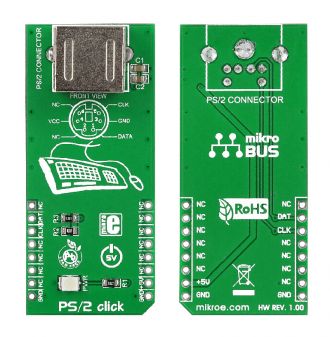
We strongly encourage users to use Package manager for sharing their code on Libstock website, because it boosts your efficiency and leaves the end user with no room for error. [more info]

Rating:
Author: MIKROE
Last Updated: 2019-05-28
Package Version: 1.0.0.1
mikroSDK Library: 1.0.0.0
Category: Adapter
Downloaded: 7097 times
Followed by: 1 user
License: MIT license
Simple demonstration of using PS/2 communication protocol. Example detects keyboard press and writes the corresponding key on UART.
Do you want to subscribe in order to receive notifications regarding "PS/2 click" changes.
Do you want to unsubscribe in order to stop receiving notifications regarding "PS/2 click" changes.
Do you want to report abuse regarding "PS/2 click".

Library Description
The library covers all the necessary functions to control PS/2 click board.
Key functions:
void ps2_gpioDriverInit(T_PS2_P gpioObj) - Function initializes GPIO driver for the desired MIKROBUS1.Examples description
The application is composed of the three sections :
void applicationTask()
{
char logText;
if ( Ps2_Key_Read( &logText, &specialFlag, &pressedState ) )
{
if ( pressedState )
{
if ( logText == _PS2_BACKSPACE )
{
mikrobus_logWrite( " <- Backspace", _LOG_LINE );
}
if ( logText == _PS2_ENTER )
{
mikrobus_logWrite( "", _LOG_LINE );
}
if ( !specialFlag && logText )
{
mikrobus_logWrite( &logText, _LOG_BYTE );
}
}
}
Delay_1ms();
}
Other mikroE Libraries used in the example:
PS2UARTAdditional notes and informations
Depending on the development board you are using, you may need USB UART click, USB UART 2 click or RS232 click to connect to your PC, for development systems with no UART to USB interface available on the board. The terminal available in all MikroElektronika compilers, or any other terminal application of your choice, can be used to read the message.